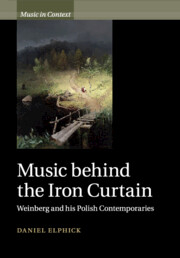Book contents
- Music behind the Iron Curtain
- Music in Context
- Music behind the Iron Curtain
- Copyright page
- Epigraph
- Contents
- Figures
- Tables
- Musical Examples
- Acknowledgements
- Note on the Text
- Introduction
- 1 Weinberg in Warsaw
- 2 The War
- 3 Socialist Realism and Socrealizm
- 4 Avant-Garde(s)
- 5 Return and Retreat
- 6 Late Style(s)
- Conclusion
- Book part
- Bibliography
- Index
- References
Bibliography
Published online by Cambridge University Press: 09 October 2019
- Music behind the Iron Curtain
- Music in Context
- Music behind the Iron Curtain
- Copyright page
- Epigraph
- Contents
- Figures
- Tables
- Musical Examples
- Acknowledgements
- Note on the Text
- Introduction
- 1 Weinberg in Warsaw
- 2 The War
- 3 Socialist Realism and Socrealizm
- 4 Avant-Garde(s)
- 5 Return and Retreat
- 6 Late Style(s)
- Conclusion
- Book part
- Bibliography
- Index
- References
- Type
- Chapter
- Information
- Music behind the Iron CurtainWeinberg and his Polish Contemporaries, pp. 274 - 292Publisher: Cambridge University PressPrint publication year: 2019

